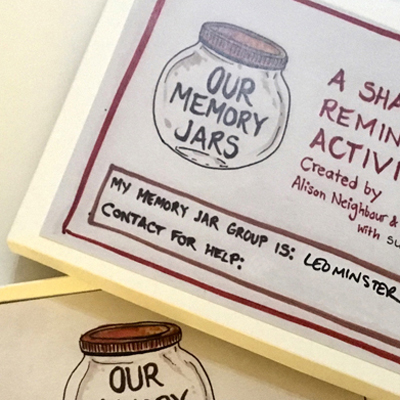Creative In Quarantine
How can we support people with dementia stay connected during social distancing?
Guidance on self-isolation and social distancing during the global Covid-19 pandemic means that for, many people, vital forms of social contact are no longer possible. For people living with a dementia, self-imposed isolation and social distancing are long-standing issues: withdrawal from society following a dementia diagnosis is common. Here, UK Meeting Centres play an important role by offering a social and creative lifeline to those living with mild-to-moderate dementia, their families, and carers. Current action on reducing covid-19 transmission has led to Meeting Centres being suspended. Centres are now developing virtual support groups, telephone buddies, and online materials in response, as well as working with Third sector partners to help deliver supplies. The core challenge, however, remains: how can we support people with dementia stay creative and connected during a period of social distancing?
A Wicked Problem
A wicked problem emerges in the delivery of Meeting Centre support that can accommodate the different needs of Centre members at home. Variation in dementia type and severity, in the level of home care and family support, in access to technology and resources all speak against a single course of action. A clumsy solution might seek to cast a wider net for new activity ideas and partnerships (reaching beyond the sector), involve a range of domain experts to assess viable ideas, and recruit voluntary sector groups to help implement and scale those ideas that work best. With this in mind, supersum approached the UK Meeting Centres with a proposal to develop a call for new approaches to creativity and connectedness in a time of social distancing.
``The atmosphere when you enter the Meeting Centre is so welcoming and everyone - staff and members - is so relaxed and happy.``
Bob and Jenny, Leominster Meeting Centre

The Story So Far
Working with the four principal demonstrator sites at Leominster, Droitwich Spa, Kirriemuir and Powys (supporting over 160 members and carers), we developed together a call that launched in early April 2020. The call focused on capturing a range of potentially viable activities and partnerships, those that can be tailored to different dementia needs; make creative use of available resources; operate beyond ‘single activity moments’ to develop and build over time; draw on existing community strengths, such as volunteer groups, to reach those who need it most; and use technology in a fitting way. As ideas came in, we reviewed them for suitability and started looking into resource that help us take as many ideas forward as possible. Our first project to launch in December 2020 is Our Memory Jars , a collaboration with artists Alison Neighbour and Kate Lovell. Our Memory Jars is funded through the Western Power Distribution COVID-19 fund. See insight post below for more details.
Our Approach

Creative and Connected
How can we help people with dementia stay creative and connected during COVID-19?
Project Partners

